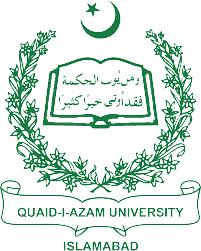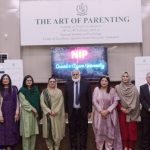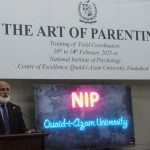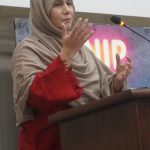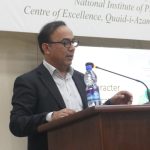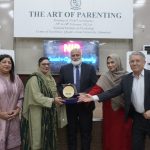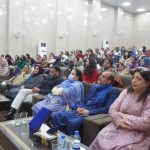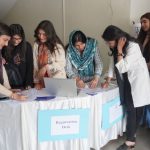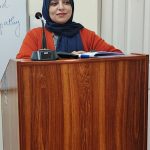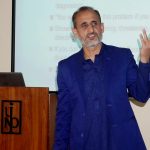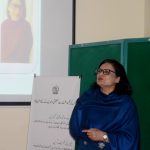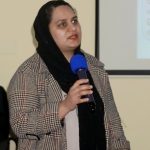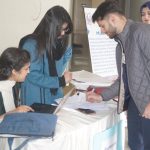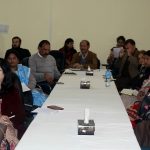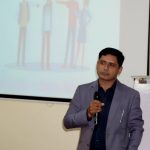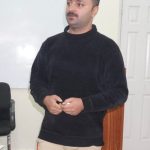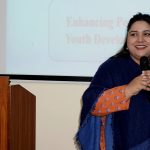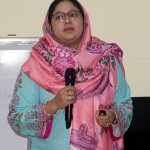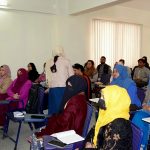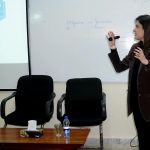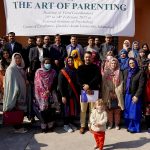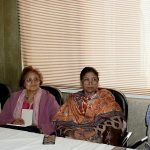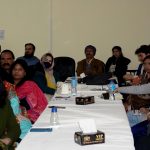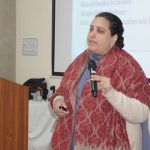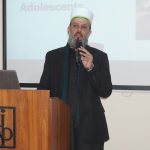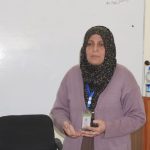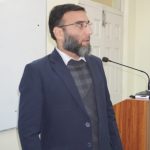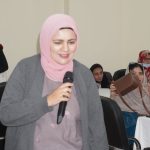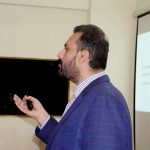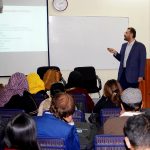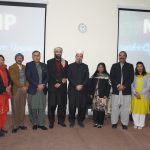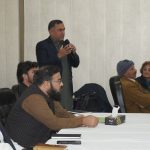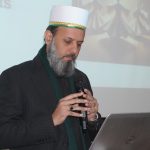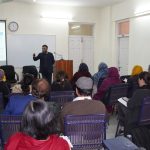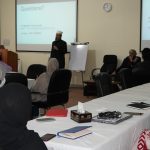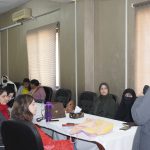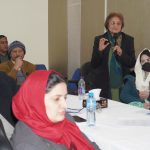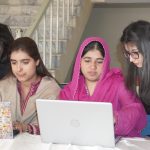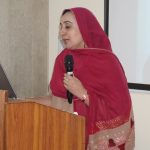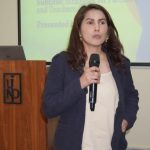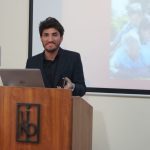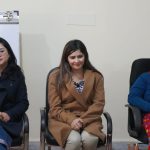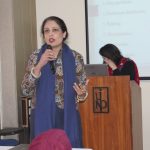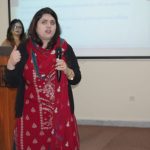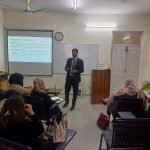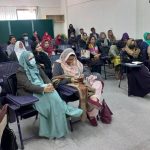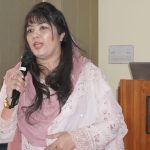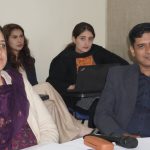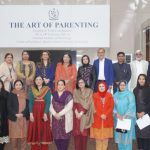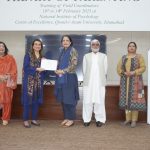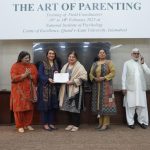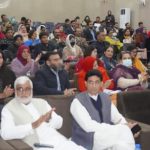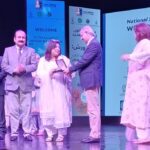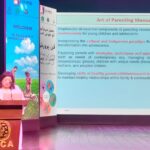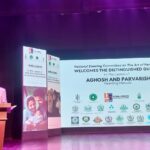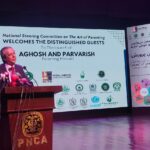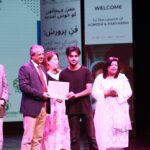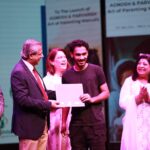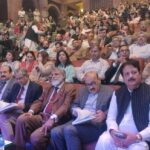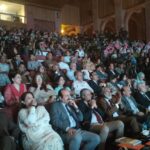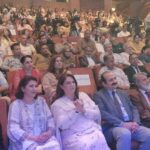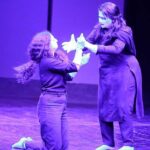Art_of_Parenting
Art of Parenting (Pilot Phase –II)
Training of Field Coordinators
(10-14 February, 2025)
The Art of Parenting Training of Field Coordinators (Pilot Phase-II) is organized by the National Institute of Psychology (NIP), Quaid-i-Azam University, in collaboration with the National Commission on the Status of Women, Aga Khan Development Network, and the Government of Pakistan. It is held from February 10 to 14, 2025, aimed to provide parents and caregivers with essential knowledge and skills for effective parenting.
Day 1: 10th February, 2025
Day 1 of the workshop commenced with the orientation session, providing an overview of the workshop objectives and structure to the participants. A pre-assessment was also carried out to evaluate the initial understanding of the participants regarding parenting practices. The inaugural session commenced with the welcome note by Prof. Dr. Rubina Hanif, Director NIP emphasizing the significance of positive parenting, focusing on holistic care and lifespan developmental milestones. She elaborated on the impact of parental role in shaping personalities of the children and adolescents, underscoring the benefits of fostering care, nurturing equity, and addressing individual shortcomings. Mr. Qayyum Ali Noorani, Head Health Department of Aga Khan Foundation highlighted the critical issues faced by young children and adolescents in terms of self-harm and vulnerability which may limit their capabilities to express and flourish to their full potential. He advocated community-based interventions, collaboration between organizations, and culturally relevant strategies to support vulnerable children by enhancing efficient parenting. Prof. Dr. Niaz Ahmad Akhtar, Vice Chancellor, Quaid-i-Azam University, highlighted the challenges faced by students lacking parental support. He also stressed the long-term effects of early parental involvement on academic and emotional well-being. He suggested that community outreach services should be accessible to all strata of parents to maximize their involvement in efficient parenting. Dr. Shazia Sobia, Chairperson, Standing Committee for Education emphasized the joint responsibility of teachers and parents in child upbringing and proposed similar training sessions in various regions of Pakistan to ensure broader provincial representation and impact. She also deliberated on the imperative role of parenting in shaping the positive personalities of children and their transformation in adolescence as responsible citizens of Pakistan. She further articulated that the role of academia is to build liaison and collaborations with civil organizations in designing effective yet approachable strategies that can be easily implemented at the grassroots level. Ms. Ruqiya Abbas from the National Commission on the Status of Women presented a vote of thanks to all the collaborators and encouraged the participants to make active contributions to the mutual process of learning to make the whole activity an enriching experience that they can carry forward as field coordinators. In the end, the Vice Chancellor of Quaid-i-Azam University and the Director of NIP presented the souvenir to chief guest Dr. Shazia Sobia. The training session concluded with accolades for NIP’s dedication to enhancing parenting practices, reinforcing the far-reaching impact of parental education on societal development.
After the inaugural, the next session was conducted by Suhail Bin Aziz, Director, National Rehmatul-lil-Alameen and Khatam-e-Nabuwwat Authority, deliberated on the importance of character education in a child’s holistic development, shaping their values, behavior, and emotional well-being. Additionally, he highlighted the multiple aspects of character building and mechanisms to inculcate character building through role modeling and consistent advocacy of moral values. He further pointed out the fact that education alone is insufficient unless combined with essential virtues such as integrity, empathy, resilience, and responsibility. He stressed that children should be taught moral and financial literacy and should be sensitized to differentiate between needs and wants. He expressed hope that fostering character development in children would positively impact society by promoting inclusivity, tolerance, and morality. Finally, he presented student learning outcomes based on various benchmarks and the role of school environments in implementing structured character education programs that integrate moral reasoning into daily interactions and curricula.
Afterwards, a session on Early Child Development & Psychosocial Development of Children was conducted focusing on the various stages of child development, with a particular focus on psychosocial development, highlighting how early experiences shape personality, emotional well-being, and social behavior. Discussions were grounded in multiple frameworks which outline key developmental crises from infancy to adolescence. Resource persons deliberated on the role of various factors and cultural influences in parenting that bear long term influences on the child’s psychological well-being. In addition, the impact of trauma and neglect on mental health and behavioral changes in the children can be regulated through parental care is also illustrated. The first day concluded with a debriefing session, allowing participants to reflect on their learning. Key takeaways were summarized, reinforcing the significance of early interventions in parenting.
Photo Gallery (Day-1)
Day 2: 11th February, 2025
The second day of the workshop commenced with an engaging and interactive session focusing on “Challenges of Parenting in the Contemporary Era.” The session provided an in-depth discussion on the evolving dynamics of parenting, the challenges posed by digitalization, and the impact of globalization on family structures. Resource persons highlighted the increasing concerns surrounding excessive screen time, digital overload, and social interaction deficits in children due to the pervasive use of mobile devices. Participants reflected on their own childhood experiences and explored how parenting practices have evolved over time. The discussion underscored the shift in parenting approaches due to modern lifestyles, changing societal expectations, and the increasing demands of professional life. A key focus of the session was the role of fathers in identity formation and emotional security. It was further stressed the role of active paternal involvement in child-rearing and positive coping strategies for single parents navigating through the complexities of modern parenting. In addition, parenting in crisis situations, including strategies for supporting children affected by climate-related disasters like pandemic and earthquakes was also articulated. The discussion extended to parental incarceration, emphasizing the importance of family and community support in mitigating its effects on children. As a key take away the participants were apprised about the unique challenges faced by transgender individuals in parenting, highlighting the need for social acceptance and policy reforms to ensure inclusive parenting practices. The session concluded with a discussion on parenting children with disabilities and orphaned children, examining the legal frameworks surrounding adoption in Pakistan and the recognized methods of adoption. Participants actively engaged in discussions, sharing insights and strategies to promote inclusive, adaptive, and nurturing parenting in contemporary society.
The second session on day two was centered on Family Mental Health And Healthy Relationships highlighting the importance of family systems, and effective stress management strategies. The session commenced with an interactive discussion, engaging participants in defining mental health and understanding its holistic nature beyond the mere absence of disease. Resource persons emphasized the interconnectedness of physical, psychological, and spiritual well-being. A significant focus of the session was on exploring the dynamics of functional families by elaborating the fundamental components ensuring a balanced and cohesive family structure. Emphasizing the importance of effective communication, participants were encouraged to avoid aggressive and dominating behaviors and instead foster meaningful relationships through active listening, honesty, and emotional regulation. The discussion further explored stress, its psychological and physiological consequences, and various coping mechanisms. The training workshop underscored the significance of fostering mental well-being and strengthening family relationships through effective communication and stress management practices, equipping participants with essential tools for navigating contemporary challenges.
Third session of the training workshop on Managing Intolerance and Incivility in Children and Adolescents provided an in-depth understanding on the nature of social behavior, particularly accentuating the importance of civility and good manners. Participants engaged in a thought-provoking discussion on incivility, and its psychosocial aftermath disturbing the equilibrium of the social fabric of society. Resource persons encouraged attendees to reflect on their personal experiences with uncivil behaviors, fostering a deeper understanding of how such attitudes manifest in daily interactions. A key component of the session involved an interactive activity where participants explored the causes of incivility and intolerance. Special emphasis was placed on the increasing prevalence of these behaviors in Pakistan, supported by relevant research findings. Participants identified numerous instances of intolerance and incivility, offering insights into their impact on social harmony. This led to a reflective discussion on how families and educators can cultivate a more inclusive mindset in younger generations. Participants shared their observations, stressing the importance of fostering respect for diverse cultures and religions, embracing differences, and promoting self-acceptance. The session concluded with a key take away that teaching tolerance should be an integral part of both family upbringing and educational curricula. By embedding these values in everyday life, society can work towards nurturing a more harmonious and accepting future generation.
The second day concluded with a reflection session, where participants summarized their learnings and discussed ways to implement the strategies shared during the workshop. The resource persons provided additional resources and guidance for continuing learning. Overall, the training workshop successfully equipped participants with valuable insights and practical tools to enhance their parenting skills. The engaging sessions, expert-led discussions, and interactive activities made the learning experience highly enriching for all attendees.
Photo Gallery (Day-2)
Day 3: 12th February, 2025
First session Parental Role in Psycho-Social Challenges of Adolescents emphasized the critical role played by parents in shaping the emotional and psychological well-being of adolescents. Discussions revolved around the various challenges teenagers face, such as emotional instability, identity struggles, academic stress, and peer pressure. A major focus was on the importance of parental support in helping adolescents navigate these difficulties. Effective parenting strategies, including open communication, were highlighted as essential in fostering a trusting relationship where teenagers feel safe to express their concerns without fear of judgment. The session also explored the impact of different parenting styles, emphasizing that authoritative parenting, which balances warmth with firm boundaries, is most effective in promoting emotional regulation and independence. Additionally, parents were encouraged to set healthy boundaries regarding social interactions, screen time, and responsibilities while also providing guidance and reassurance. The discussion underscored that parental involvement and support play a significant role in helping adolescents develop better decision-making skills and emotional resilience.
Second session Managing Peer Pressure and Social Media focused on the profound impact of peer pressure and social media on adolescent behavior and self-perception. Trainers elaborated on how social comparison, cyberbullying, and unrealistic beauty standards contribute to anxiety, low self-esteem, and risky behaviors among teenagers. The discussion explored how adolescents often feel pressured to conform to peer expectations, sometimes leading to poor decision-making and engagement in harmful activities. A key aspect of the session was raising awareness about cyberbullying, its psychological impact, and ways to seek help if affected. Additionally, digital literacy was emphasized as a crucial skill, enabling adolescents to critically assess online content, differentiate between reality and curated lifestyles, and avoid falling into the trap of seeking online validation. Assertiveness training was introduced to help teenagers develop confidence in resisting negative peer pressure and making independent choices. Practical strategies were shared to encourage healthy social media habits, including mindful scrolling, engaging in offline activities, and setting time limits to avoid excessive screen time. The session reinforced the idea that responsible social media usage and strong decision-making skills can help adolescents build a healthier self-image and maintain emotional well-being.
The final session Enhancing Positive Youth Development explored strategies for fostering resilience, self-confidence, and leadership skills in young individuals. Discussions centered on the importance of structured activities such as sports, arts, and volunteer work in promoting teamwork, social skills, and personal growth. Mentorship was highlighted as a key factor in guiding adolescents toward a positive developmental trajectory, as role models from educational, professional, or community settings can provide inspiration and direction. The session also stressed the significance of goal-setting in empowering adolescents to take control of their future. Participants were introduced to the concept of SMART (Specific, Measurable, Achievable, Relevant, Time-bound) goals, helping them structure their aspirations practically and realistically. Additionally, techniques to boost self-confidence, such as self-affirmations, public speaking exercises, and self-reflection, were discussed as effective ways to enhance self-esteem. The ability to think critically and make informed decisions was also identified as an essential skill, particularly in navigating challenges and evaluating risks effectively. The session concluded with interactive exercises that encouraged participants to identify their strengths and commit to personal development goals, reinforcing the idea that growth is a continuous process requiring effort, resilience, and self-awareness.
The day concluded with reflective discussion where participants shared their thoughts on the key takeaways from the sessions and how they could implement these strategies in their daily lives. Many participants acknowledged the importance of parental involvement in helping adolescents manage emotional distress and navigate challenges more effectively. There was also a strong realization of the impact of social media on mental well-being, with several participants expressing the need to adopt healthier online habits. The discussion further highlighted the importance of developing resilience and self-confidence, with participants recognizing that these qualities are built through consistent practice, exposure to challenges, and a supportive environment. Overall, the sessions provided valuable insights into adolescent development, offering practical strategies that could be applied in real-life scenarios to promote mental well-being, positive behavior, and personal growth.
Photo Gallery (Day-3)
Day 4: 13th February, 2025
The fourth day of the training workshop started with a session on “Cultural Diversity and Gender Roles in Parenting” focused on the evolving dynamics of gender roles, generational gaps in parenting, and the impact of social media on children’s development. Using the ecological model, the resource person explained how environmental systems—from immediate surroundings (microsystem) to broader societal influences (macrosystem) and the impact of time (chronosystem)—shape gender learning and parenting practices. The session underscored the critical link between parenting practices and child development, highlighting how parental involvement through monitoring, guidance, and positive reinforcement influences children’s gender perceptions. As primary agents of socialization, parents instill cultural values, ensure safety, impart essential life skills, and provide emotional support. A significant discussion was dedicated to the role of social media in shaping children’s socialization. Concerns were raised about the potential negative effects of excessive digital exposure, including social media addiction and unhealthy gaming habits. A video on child abuse and social media literacy illustrated these risks, emphasizing the need for parental oversight and content control measures to promote a balanced digital lifestyle. The session also explored cultural diversity in parenting within Pakistan, contrasting collectivist and individualist approaches. Collectivist parenting, rooted in respect for elders and social responsibility, was compared to individualistic parenting, which emphasizes independence and personal decision-making. Trainers highlighted the importance of balancing traditional and modern influences to create a nurturing environment for children’s holistic development. A key theme of the discussion was the role of gender norms in parenting. Traditional expectations often assign caregiving roles to mothers and leadership roles to fathers. The session encouraged parents to challenge these stereotypes and promote gender equality within the household. By fostering shared responsibilities and active participation from both parents, families can create a more equitable and supportive environment for children. The session concluded by reinforcing the importance of adaptive parenting—one that integrates cultural values while embracing progressive approaches to child-rearing. Participants were urged to strike a balance between discipline and autonomy, ensuring children grow up in a safe, supportive, and inclusive environment.
The second session Spiritual Development of Children and Adolescents focused on fostering spiritual development in children and adolescents, emphasizing the role of parents in instilling a sense of meaning in life beyond religious sects. The resource person highlighted the importance of leading by example, demonstrating kindness, and using storytelling—particularly narratives of prophets and messengers—to build character. Encouraging children to share with others was emphasized as a way to promote generosity and compassion. Natural elements such as trees and water were used to illustrate spirituality, linking it to self-accountability, moral values, and ethical development. The resource person stressed the importance of gratitude, distinguishing between needs and wants, and encouraging children to express appreciation for blessings through daily prayers and reflection. Meditation and spiritual tunes were recommended for enhancing cognitive abilities and decision-making. Additionally, engaging with the elderly was suggested as a means to strengthen faith and wisdom. The session underscored spirituality as a coping mechanism, promoting mental peace, resilience, and emotional well-being. Sufi teachings, including quotes from Rumi and Imam Ghazali, were shared to illustrate finding meaning in suffering and the value of seeking knowledge and enlightened company. Spirituality was presented as a tool for managing stress, greed, and depression by fostering contentment and inner peace. An important discussion clarified the distinction between religiosity and spirituality, with religiosity referring to structured beliefs and practices, while spirituality was defined as a broader personal connection to meaning and purpose. The evolution of spiritual needs was also explored, with younger children benefiting from foundational moral guidance and adolescents requiring open discussions for self-exploration. Parents and educators were encouraged to create a balanced approach that integrates spiritual growth with modern psychological principles, including gratitude, mindfulness, and self-reflection while respecting diversity and critical thinking. The session concluded on a positive note, reinforcing that nurturing spirituality is essential for emotional, moral, and psychological well-being. It emphasized that spirituality is not solely tied to religious practices but is about instilling empathy, resilience, and ethical decision-making, ultimately guiding adolescents toward a purposeful and fulfilling life.
The third session Integrated Care and Managing Vulnerabilities of Adolescents focused on the various challenges and vulnerabilities faced by adolescents and the importance of integrated care in addressing them. The discussion began with a basic understanding of vulnerability, outlining different categories of vulnerable children. These included adolescents affected by armed conflict, abuse, neglect, chronic illnesses such as HIV, and those requiring legal protection. Experts emphasized that recognizing and addressing these vulnerabilities at an early stage is crucial for ensuring their well-being and development. A key focus of the session was identifying the common struggles adolescents face, including mental health issues, substance abuse, and academic stress. The trainers stressed the need for early intervention by recognizing warning signs of emotional distress and taking proactive measures. Counseling interventions, peer support programs, and structured mental health initiatives were highlighted as effective strategies for helping adolescents navigate these challenges. The session underscored the significance of a multi-disciplinary approach in managing adolescent vulnerabilities. Experts advocated for collaboration between parents, educators, healthcare providers, and mental health professionals to ensure a holistic support system. They highlighted that an integrated approach not only addresses immediate concerns but also fosters long-term resilience in adolescents. The role of schools in adolescent mental health was particularly emphasized. Trainers suggested that educational institutions should establish mental health awareness programs, safe spaces for students, and accessible support services to help adolescents cope with their struggles. By fostering a supportive school environment, students can develop healthy coping mechanisms, build positive peer relationships, and enhance their overall well-being. Additionally, the session highlighted the importance of equipping adolescents with essential life skills to strengthen their coping mechanisms. Strategies such as stress management techniques, resilience training, and social-emotional learning programs were discussed as key components in empowering young individuals to navigate their challenges effectively. In conclusion, the session reinforced that addressing adolescent vulnerabilities requires a collective effort from families, schools, and healthcare providers. A comprehensive and collaborative approach can ensure the holistic development of adolescents, enabling them to overcome challenges, build resilience, and lead fulfilling lives.
The final discussion provided an opportunity for participants to reflect on the insights gained from the sessions and explore practical ways to implement them in real-life scenarios. Participants acknowledged the importance of culturally informed and gender-equal parenting in fostering a supportive environment for children. There was also a shared recognition of the role of spirituality in strengthening adolescents’ emotional resilience and moral decision-making. Furthermore, the discussion highlighted the necessity of an integrated care approach, emphasizing the collaboration between families, educators, and mental health professionals in addressing adolescent challenges. The session concluded with participants expressing a commitment to applying these strategies in their personal and professional interactions to promote the well-being of children and adolescents.
Photo Gallery (Day-4)
Day 5: 14th February, 2025
The final day of the workshop featured group presentations by participants from reputable organizations such as National Commission for Human Development, Saiban-e-Pakistan, National Counter Terrorism Authority, Pakistan Poverty Alleviation Fund, Beacon House BMI G (Margalla Campus), The Aims School & College, Al-Farabi School and College, National Health Services Regulation and Coordination District Health Office, Ministry of Religious Affairs, The City School, The Educators School, Al Farooq Islamic and Modern School, Bahria Foundation, Pak Turk Maarif International School, National Institute of Psychology (NIP) and Dr AQ Khan School and College focusing on key parenting and child development themes, followed by a concluding ceremony.
The presentations addressed critical areas on the art of parenting. Responsive Caregiving: Emphasized the importance of emotional attunement, secure attachments, and active listening to foster emotional and cognitive development. Safety & Security of Children: Highlighted physical and emotional safety, child protection policies, and awareness to prevent abuse and neglect. Early Learning Opportunities: Stressed the role of stimulating environments, play-based learning, and parental involvement in early education. Physical, Mental & Spiritual Health: Advocated for balanced nutrition, physical activity, mindfulness, and ethical values to promote holistic well-being. Healthy Family Relationships: Focused on open communication, conflict resolution, and family bonding to build emotional stability. Parental Role in Emotional Support & Discipline: Encouraged positive discipline, emotional validation, and supportive home environments. Resilience Building: Proposed resilience training, peer mentorship, and stress management techniques for children and adolescents. Positive Family Climate: Highlighted the importance of warmth, shared values, and constructive conflict resolution. Adolescent Well-Being: Introduced initiatives like social media awareness campaigns, mental health first aid training, and community engagement to support adolescents. The presentations combined theoretical insights with practical action plans, including interactive workshops, school-based programs, and community forums.
Photo Gallery (Day-5)
Art of Parenting (Pilot Phase –II)
Training of Field Coordinators
(10-14 February, 2025)
Concluding Session
14th Feb. 2025
The concluding session began with a welcome note by Prof. Dr. Rubina Hanif, Director of the National Institute of Psychology (NIP). She emphasized the significance of nurturing parenting, focusing on holistic care and lifespan developmental milestones. She elaborated on the impact of attachment patterns and neurobiological outcomes, underscoring the benefits of nursing care, equity, and addressing individual shortcomings. Saleha Zakir Shah, Director General of Monitoring & Evaluation at the National Counter Terrorism Authority (NCTA), appreciated the initiative and highlighted the responsibility of workshop trainees in shaping parenting styles across the nation. She stressed the importance of such programs in fostering a secure and resilient future generation. Dr. Shafiq-ur-Rehman, Registrar of Quaid-i-Azam University, acknowledged the training as state-of-the-art and highly relevant in today’s context. He emphasized the importance of showing obedience to parents and the role of such workshops in reinforcing family values. Ms. Shabana Nawaz, Deputy Chief of the National Commission on the Status of Women (NCSW), appreciated the initiatives aimed at shaping parenting practices. She highlighted the challenges posed by digitalization and easy access to information, stressing the need for adaptive parenting strategies in the modern era. Mr. Qayyum Ali Noorani, Head of the Health Department at the Aga Khan Foundation, addressed the critical issues faced by young children and adolescents, particularly self-harm and vulnerability. He emphasized the importance of creating environments where children can express themselves and flourish to their full potential. Chief Guest Senator Bushra Anjum Butt, a dedicated educator, academician, and politician, shared her thoughts on the topic and expressed her keen interest in societal acceptance of change. She commended the collaborative efforts of all stakeholders and urged continued support for such initiatives to bring about meaningful change in parenting practices.
The workshop concluded with a certificate ceremony, recognizing the contributions of participants and trainers. This initiative, a collaboration between the National Institute of Psychology, National Commission on the Status of Women, Aga Khan Development Network, and the Government of Pakistan, provided practical strategies to enhance parenting skills and adolescent well-being, fostering nurturing environments for future generations.
Photo Gallery (Concluding Session)
Launching ceremony of the Art of Parenting
Manual for Master Trainers
9th July 2024
Training manual on The Art of Parenting was launched by National Commission on Status of Women (NCSW) on 9th July 2024 in collaboration with National Institute of Psychology (NIP), Agha Khan Foundation and Dukhtaran-e-Pakistan. This manual is developed for master trainers. First part, Aghosh caters to parenting of children from the time of conception to nine years of age. The second part, Parvarish caters to the parenting needs of children aged 9 to 19 years of age. It seeks to create a supportive nurturing and enriching environment for children at all stages of development. The chief guest of the occasion was the Minister for Human Rights, Mr. Azam Nazeer Tarar. The Welcome Address was given by Nilofar Bakhtiar, Chairperson, National Commission on Status of Women. She highlighted the need to take care of families, as not only are they our present but also our future. She praised the contributors who were able to make the complex art of parenting accessible for parents and caregivers.
While discussing the salient features of Art of Parenting Manuals, Director, National Institute of Psychology, Prof. Dr. Rubina Hanif, appreciated her faculty for their contribution in this national cause, and said that parenting is an art that needs to be learned by parents themselves before embarking on the parenting of children at homes. She highlighted that the modules on parenting are what our society took for granted for generations. Students from the National institute of psychology presented an impressive mime on the plight of women. The mesmerizing performance was appreciated by the audience. Other prominent attendees included Mr. Rana Mashahood, Mr. Muhammad Kashif Irshad, Mr. Akhtar Iqbal, Dr. Farkhanda Zia and other distinguished guests. The program was attended by representatives of government ministries, public and private sector, and many students.

